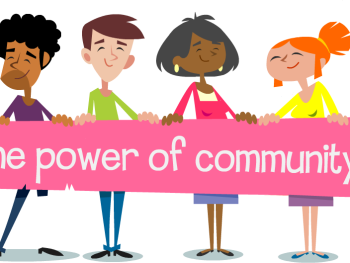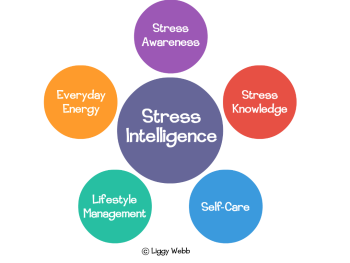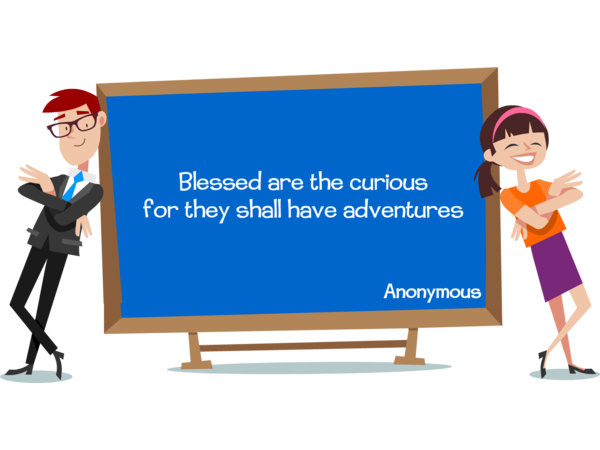Eleanor Roosevelt once said,
“I think, at a child’s birth, if a mother could ask a fairy godmother to endow it with the most useful gift, that gift should be curiosity”.
I must admit I am inclined to agree.
Curiosity and exploration help us to embark on some of our greatest adventures. They are the first steps our mind takes toward some of our greatest discoveries. Learning something new, overcoming challenges and exploring our potential are all possible because we are curious, and we have the desire to explore.
I certainly know from personal experience that curiosity has helped me to be more resilient in challenging times and life is never boring for a curious person!

In many ways, curiosity is the catalyst of innovation and curious people have an ongoing, intrinsic interest in both their inner experience and the world around them.
Curiosity is also the engine of intellectual achievement and those who are more interested in a topic will learn faster and prime the brain better for learning. It is also associated with high performance in both academic and work settings and there is an increasing amount of evidence that suggests that the more you learn, the more you want to learn.
Curious minds are active minds, and active minds become smart minds. Curiosity is associated with intelligence, creativity and problem-solving ability. Curious people cultivate interesting and creative environments for themselves as they seek out new experiences and are open to exploring new ideas and possibilities. Everyone possesses curiosity to some degree, although people will differ according to the depth and strength of their curiosity and their willingness to act on it.

So, what are the benefits of being curious?
Here are five examples…
1. Better brain health
The urge to explore and seek out new things will help you to remain vigilant and gain knowledge about your constantly changing environment. This may explain why our brains are evolved to release dopamine and other feel-good chemicals when we encounter new things.
2. Improved intelligence
Curiosity is the engine of intellectual achievement and those who are more interested in a topic will learn faster and prime the brain better for learning. Curiosity is associated with high performance in both academic and work settings. There is evidence to suggest that the more we learn, the more we want to learn.
3. Cultivate positive relationships
Let’s face it we all like to feel as if people are interested in us. It is something that we value in our friendships. Curiosity can help us to be more empathetic because we are making an effort to really find out about someone else by questioning rather than just taking everything at face value. In turn this helps us to understand and care more deeply.

4. Solve problems
Curious minds are active minds, and active minds become smart minds. Curiosity is associated with intelligence, creativity and problem-solving ability. Curious people cultivate interesting and creative environments for themselves as they seek out new experiences and are open to exploring new ideas and possibilities.
5. Never get bored
Curious people rarely find life boring because there is always something new to explore and discover. Any event can be turned into something fascinating by sharpening your observation skills and giving your attention to something you would normally miss.

Here are some suggestions to help you to be more curious:
Embrace diversity
Due to globalisation we are living in exciting times and working and sharing our lives with people from so many different backgrounds. We are also working with people across a wide range of age groups. This can be so enlightening and educational and will help you to broaden your perspective by listening and learning from others.
Being curious about differences will help you to expand your mind and expose you to other viewpoints, values and beliefs.

Ask open questions
There is a great benefit to asking open questions, for example why, how, where, what, when, which, who? These types of questions open up opportunities to gain further information and avoid shutting down conversation with closed questions.
It is also important to be aware of your tone when you ask questions to ensure that you avoid turning a curious conversation into an interrogation!
Listen
Be really interested in what other people have to say and appreciate that all the time your mouth is open you are not learning. Be genuinely interested in what other people have to say to you and do this without making assumptions and judgements so that you can fully absorb all the information. By demonstrating active listening skills through body language and interpersonal skills you will also encourage the other person to open up to you.
Be present
Being fully present when you are with someone will help you to focus and attend to what someone is actually saying. Switching mobile technology off when you are with someone will help you to be mindfully present. Also quieting your own mind chatter and being calm when you are in any situation will help you to be absorbed in what is actually going on around you. Being mindfully present is something you have to practise and a very necessary discipline.

Adopt a growth mindset
When you adopt a growth mindset, you understand that even your most basic abilities can be developed through dedication and hard work. Brains and talent are just the starting point and the potential to learn and grow is an opportunity available to everyone at any age. The ability to learn, unlearn and relearn will help you to keep what you do relevant and useful. Being open-minded and willing to learn are the key ingredients to fresh thinking.

Be comfortable with not knowing
It would be impossible to know absolutely everything and there will always be something new to learn. You don’t need to be afraid to admit that you don’t have the answer. It doesn’t mean you have failed or lack intelligence. Saying “I don’t know. However, I can find out” gives you an opportunity to embark on a whole new chapter of discovery.

Be open to surprises
The conundrum with surprises is that too many can make us anxious and too much certainty in our lives can make things a bit dull and boring. You may well feel comfortable with certainty. In many ways you will feel more alert and alive when you don’t know what’s going to happen next. Introducing new situations into your life, talking to strangers, eating new food, or taking a different route, are just small ways that you bring an element of surprise into your life. Learn to be comfortable with uncertainty and surprises because you never know what you might discover!
Let go of the past
It can be easy to get trapped in the past and rely on what you have always done. If you want different outcomes, however, you need to be prepared to let go of the past and not let it affect your future. Starting each day with a beginner’s mind and looking to the future with an open mind will help you to see every situation you are in from a fresh perspective.
Remember that was then and this is now, and every day of your life can be the beginning of a curious new journey.

In summary
Curiosity in many ways comes from intentional pauses. Human beings are creatures of habits in many ways and can get caught up in habitual behaviours that lead them down the same old path and routine. Making time to be more curious and to explore new ways of doing things can be the catalyst to fresh thinking, new discoveries and exciting adventures.
For updates for future blogs, free webinars and various other useful resources please do join my newsletter.













